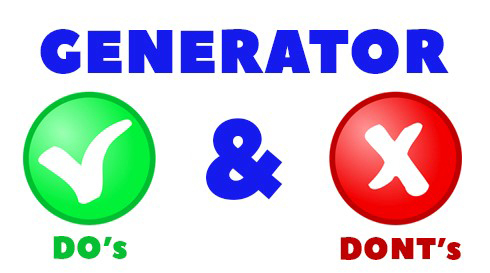Shopping for PTO Generators
- By Jackson Carter
- Nov 15, 2019
Is your air-cooled engine or generator making a lot of noise? Is it keeping you up at night or annoying you with its loud humming sound? If it is, there might be the possibility that you’ve thought about covering it up with something to reduce the volume. Before you do anything, we need to talk about everything that can go wrong if you do cover up your air-cooled engine/generator.
You should NEVER cover your air-cooled engine or generator. Covering it can cause the generator to overheat, as the air has nowhere to escape to, and there is even the potential hazard of a fire if you cover it up. Even if the noise is irritating and loud, never cover your air-cooled engine, because the risks far outweigh the benefits. Would you rather have a loud noise, or have a damaged engine that needs replacing, or even worse, start a fire that could damage more than just the engine/generator?
Just because you can’t cover your air-cooled engine/generator up, doesn’t mean there aren’t ways of reducing the noise. One thing to always check for is that the muffler is working properly. The muffler is designed to help decrease the noise on engines and generators and is very useful in preventing lots of sound from escaping the engine/generator. If your engine or generator doesn’t have a muffler, investigate getting one. If the muffler is broken or not working, you may have to buy a new one.
If the engine/generator doesn’t allow for a muffler to be used, you may have to use other methods of keeping it quiet. Another option to help reduce engine noise is what’s called a sound deadening compartment. Like it sounds, this is a compartment that covers the engine or generator and helps keep the noise levels down, but the difference between this and just covering the engine yourself is that this compartment is very well ventilated and will prevent your engine or generator from overheating.
Even with other methods available to help reduce noise, there is nothing that can completely stop an air-cooled engine or generator from making noise. If you’re looking for something that makes little to no noise you might invest in a liquid cooled engine/generator, and if you have no problem with a little noise, or in some cases a lot of noise, then you should do just fine with an air-cooled engine. Just remember to never cover it up to prevent overheating. If you have any questions about reducing air-cooled engine noise you can contact our Application Specialists.

If you are about to become the first-time user of a generator, there are some important tips to keep in mind as you prepare your new unit. Whether you are prepping a generator to support a business in the event of power loss or about to fire up your generator at home after a major storm, keep these tips in mind to help avoid both generator damage and injury or loss of life.
Visit this Red Cross page for more safety tips related to post-disaster generator use. We also have an easy to read Generator Wattage Chart to help you determine the typical wattage of appliances and tools in your home, and our How to Choose a Generator page can help you select the right model for your needs. Give us a call and one of our Application Specialists will be more than happy to assist you.
Finding a reliable, quiet professional grade jobsite generator that is still capable of running your power tools and other equipment, while not damaging workers hearing, can be a difficult task. Many generators operate at decibel levels that are above what is safe for the human ear. And not only is safety involved, at times the jobsite itself may require lower noise levels due to location to other places of business and other concerns. Most quiet jobsite generators are actually inverter generators which employ advanced technology that not only keeps the decibel level lower, but also can help with fuel efficiency by throttling power based on power needs.
One of the most durable quiet professional jobsite portable generators we sell is the Kubota Lowboy II GL7000. This is a new and improved Lowboy II model from Kubota, a worldwide company also well known for their tractors and lawn equipment. While some noisy generators used on jobsites are actually a safety threat to workers’ hearing – this generator is extremely quiet at only 66 dB. That’s less than the volume of an average vacuum cleaner!
Avoid tugging away at a starter cord: the Lowboy II’s electric starter uses the included battery to fire up for the day’s work. The 7.4 gallon tank can keep you going for up to 10 hours at its top prime power output of 6500 watts, and the 10.9 horsepower liquid cooled engine can handle any job size. Easily portable with a tow point or fork lift pockets or you can further increase the ease of moving your generator from site to site with an optional wheel kit to remove one more potential worker injury pain point.
This quiet jobsite generator is a great choice for food service industry users as well. The quiet, liquid-cooled diesel engine provides consistent power without interfering with customer and employee communications. In addition, it offers lower maintenance costs in the long run than comparable air-cooled models. Make the most of your initial investment with the longevity offered by this high quality, easy to use generator.
Find out more about Kubota Lowboy Generators here, or contact us today at 888-264-2189 for more information on how a quiet jobsite generators can help solve your power problems!
Perhaps you've listened to an old record with a sound technician and heard that they are "out of phase." The audio engineer is talking about sound waves, not electricity, but they are similar. Let's begin with a short review of electricity.
AC/DC Electricity 101
DC power (or Direct Current) flows in one direction on a circuit, while AC power (Alternating Current) flows both ways in a circuit. Hence, the wiring is different for DC and AC circuits, as well as for 3-phase AC power (more on this below). Their respective wave forms look something like this:
(GRAPHIC ONE)
Or, thinking in terms of magnetic flux, the alternating current is always in flux as the rotor moves through the magnetic field, oscillating between positive and negative voltage. This flux creates the AC wave form, and thus, AC power, which most residential appliances run on. However, at certain points there is zero potential voltage when the wave crosses the X axis, and this can be a disadvantage to using single phase AC power in commercial-grade settings.
Larger appliances and commercial (or agricultural) settings have a higher load (greater demand or resistance), and therefore require more kW to function properly. But this also requires higher gauge wire, increased amps and volts, and places a higher demand on motors running on single phase AC power.
Enter 3-Phase AC Power
In the late 19th century, Galileo Ferraris and Nikolai Tesla discovered a way to remedy this situation with what we call 3-phase electricity. Essentially, 3-phase electricity is the AC wave form staggered at 120 electrical degrees to provide a more robust current that mimics DC power. The wave form looks something like this:
(GRAPHIC TWO)
Advantages of 3-Phase Power
The main difference is that at no point in the wave form is the voltage potential zero (as in single phase). This results in at several advantages:
If you ever have the chance to run 3-phase electricity in your building, or if you're considering a 3-phase generator and you have the capability of 3-phase electricity, it is always worth it. Take a look at our wide selection of 3-phase generators, by selecting 3-phase in the Left-hand navigation filters on our website. Of course, if you have other questions, feel free to call us at 888-264-2189.